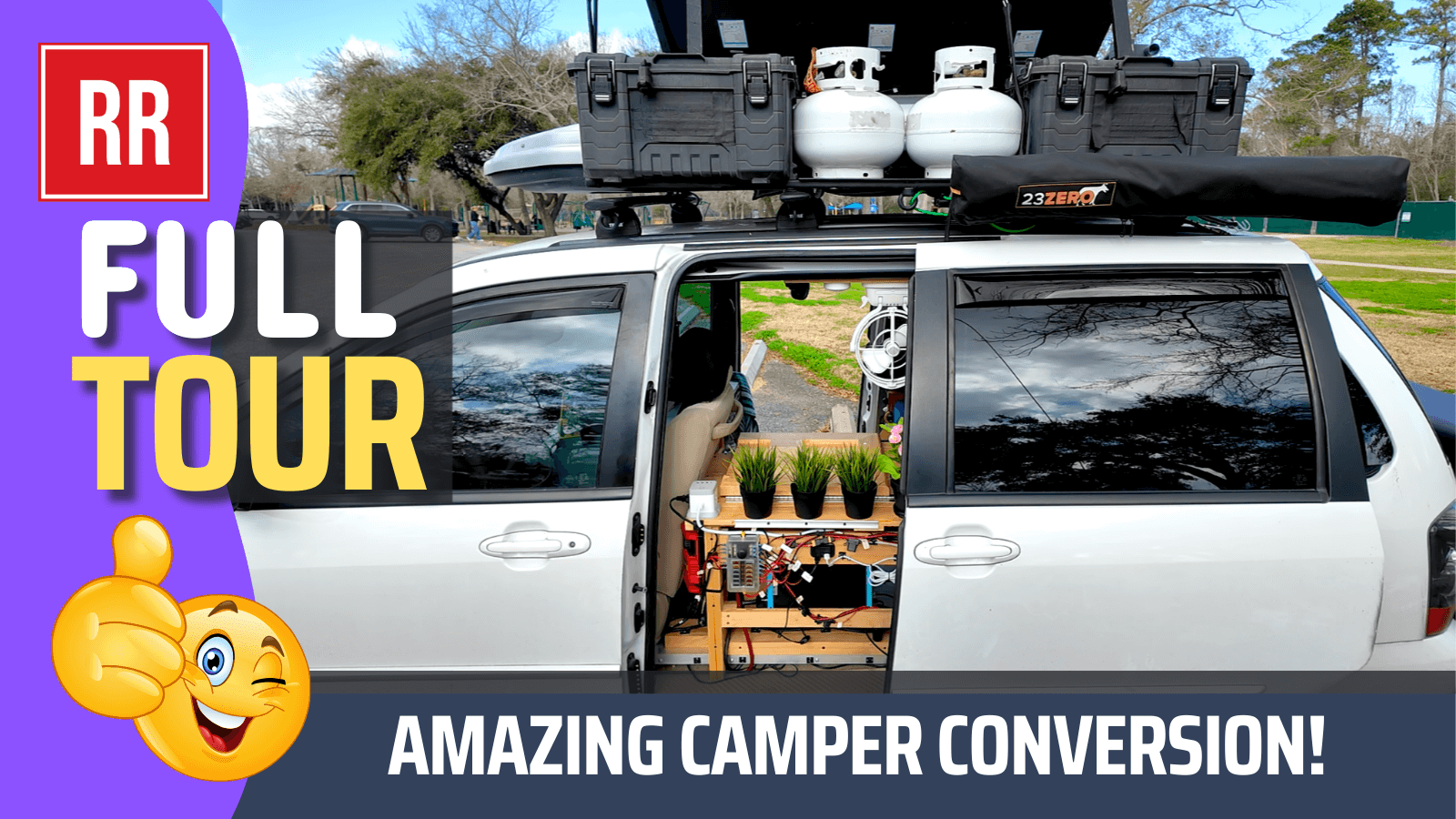DIY Minivan Camper Conversion: My Fully Loaded Off-Grid Adventure Rig

When I first looked at my minivan, I didn’t just see a family vehicle — I saw the perfect canvas for a DIY minivan camper conversion. With some creativity, tools, and a lot of planning, I transformed it into a fully loaded off-grid camper that’s ready for road trips, camping, and extended off-grid living.
From the outside, it’s obvious this isn’t your typical stealth van. Four roof crossbars support a 6-foot Thule cargo box, three rooftop solar panels, propane tanks, extra gear boxes, a privacy shower tent, and a massive 270° awning. Fully loaded, my minivan stands 7'3" tall — and every inch of that height serves a purpose.

Links to products, devices and gear featured in this video
Minivan Camper Interior: Compact Comfort in 35 Square Feet
Inside my minivan camper build, space is optimized for both comfort and functionality. I designed a custom folding sofa bed perfect for tall travelers, with extra leg support, a 5-inch mattress, and heavy-duty drawer slides for an easy sofa-to-bed conversion.
The kitchen setup is one of my proudest features. I built a lightweight sink module using a removable mixing-bowl basin that drains into a gray water tank. Fresh water comes from 3-gallon jugs, pumped through a USB-powered faucet and filtered before use. A butcher block countertop holds a double-burner stove, an air fryer, and a microwave on small wheels for easy access.
Cold storage is handled by two 20-quart 12-volt units — one fridge, one freezer — which lets me stay off-grid longer without restocking. Dry goods are stored under the bed in baskets, while magnetic spice racks, shock-corded bottle holders, and pull-out trash cans maximize every inch of available space.
Off-Grid Power and Solar Setup
At the heart of my off-grid van build is a Bluetti AC200Max power station with 2,700 Wh of lithium battery capacity. I charge it through rooftop solar panels or via my alternator while driving. A Bluetooth app lets me monitor power usage, solar input, and battery levels without leaving the van.
All 12-volt circuits — including fridge, freezer, shower pump, TV, and fans — run through a dedicated fuse panel. I’ve added inverters, circuit breakers, and DC outputs to power my laptop, cooking appliances, and even my CPAP machine.
The hinged rooftop solar panel frame lets me tilt the panels for maximum sun exposure and doubles as access to my gear boxes underneath.
Outdoor Cooking, Shower, and Storage
One of my favorite features of this DIY minivan camper is the outdoor living setup. My privacy shower uses a 7-gallon water tank with a quick-connect hose and hangs between two shower curtains supported by a bent tent pole on the roof rack.
Cooking outdoors is easy thanks to quick-connect fittings that let me move my sink and stove outside. The swing-out cargo carrier on the back holds my generator, buckets, camp chairs, and ladder — keeping bulky gear out of the main cabin.
Staying Safe and Comfortable on the Road
For comfort, I installed nano-ceramic window tint, which keeps the interior up to 15°F cooler in summer. Custom-fit window covers made from Reflectix and coroplast provide complete privacy at night.
Safety is equally important, so I’ve equipped the van with a smoke detector, propane and natural gas detector, and a carbon monoxide alarm. A high-efficiency fan mounted above the counter doubles as ventilation and a cooking exhaust.
Why This Minivan Camper Works
This minivan camper conversion proves that you don’t need a giant van or RV to live comfortably on the road. By combining creative storage, a reliable power setup, and multi-use furniture, I’ve packed everything I need for van life into just 35 square feet.
Whether I’m cooking inside, working from my laptop, or showering outdoors under the awning, this build is my perfect home on wheels — and it’s proof that small spaces can do big things.
If you’re thinking about your own DIY camper conversion, this build shows what’s possible. With a few smart upgrades and some problem-solving, even a small minivan can become a comfortable, fully functional off-grid rig.